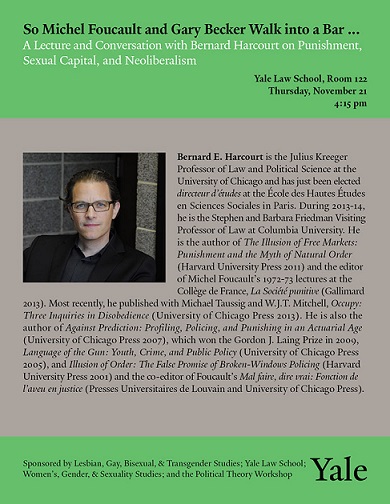Bernard E. Harcourt, from Occupy Wall Street
In an odd way, it almost feels as if the Occupy movement had it harder than other contemporary resistance movements—dare I say, harder than even the Arab Spring revolutions. To be sure, the resisters in the Arab world faced (and may still face today) brutal authoritarian regimes. They risked, and in many cases lost, their lives. Their unmatched courage has been an inspiration around the world. On that count, they have stared down a far more violent and oppressive adversary than anyone else. But they had one. They had an identifiable adversary—oppressive and authoritarian regimes—that they could target and topple. They had and have a concrete goal, grievances, an objective, demands, and a vision for reform—all wrapped into one. They could resist until the authoritarian regime ceded power. It is difficult to say, but the protesters in the Arab world had a cruel advantage: an external oppressor.
By contrast, what the experience of the Occupy movement has revealed is that there is no similar adversary to “overthrow” in the United States. In Egypt there was President Hosni Mubarak’s regime, and then the military establishment. In Tunisia the people could oust the longtime president, Zine el Abidine Ben Ali. In Libya there was Colonel Muammar Gaddafi. In Syria, President Bashar al-Assad. Even in Europe today, the political resistance movements have specific targets. In Greece there are the Germans and French, their austerity measures, and the International Monetary Fund. But in the United States there is nothing to topple and no one to oust. With political elections every two to four years, the American populace can vote their politicians out of office, but hardly anything changes. There are moments of victory and defeat—of celebration and mourning. For some, the celebration was Grant Park on election night in November 2008; for others it was two years later, in 2010. These were moments of utter triumph and loss, ecstasy and despair. And yet so little changed. Imprisoned populations continue to grow. Inequality continues to increase. The Democratic and Republican years fade into each other and into the steady, plodding march toward mass incarceration and growing inequality. Only state bankruptcy and a brutal recession seem to slow down prison growth today—and perhaps only temporarily.
The genius of democratic structures of governance is that they provide no target anymore. There is no monarch, no tyrant, no dictator. By cutting off the king’s head—not just metaphorically or methodologically, as some have urged us to do, but physically—”we the people” have so diluted accountability and attribution that we are left unable to find a target to engage politically. We have become the tyrants. It is devilishly ingenious.
To put it another way. The four hundred wealthiest Americans have a combined new worth greater than 150 million Americans. Once upon a time, they would have been marked as a class apart, nobility, perhaps an aristocracy. They would have had titles; their social and political relations would have been set apart by feudal or aristocratic legal regimes. Their “excess of power” would have been legally recognized. Just as we had special codes for black slaves in the antebellum period, or Black Codes for African-Americans during Reconstruction and Jim Crow, there would have been distinct legal regimes in this country. At least, at some earlier time. But not today. We are all equal before the law. We are all—well, practically all—citizens, with equal voting rights and equal civil rights. Again, not all—not certain felons who have been disenfranchised, or those too poor or uneducated to be ably to comply with our administrative hurdles. But extending the franchise here and, equally importantly, fighting against insidious forms of voter suppression—noble endeavors indeed—are practically irrelevant when a handful of Americans control such massive resources. The partisan system, dual party politics, Congressional debates, presidential elections—there is neither anything to overthrow nor any simple way out. That, I take it, is part of what was being said at Occupy Wall Street.
